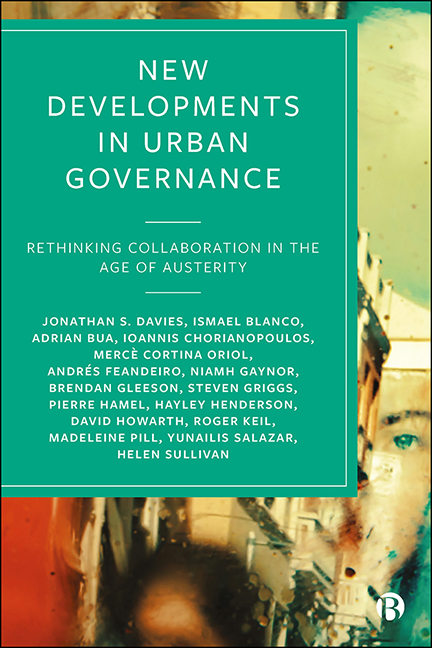Book contents
- Frontmatter
- Contents
- List of Figures and Tables
- Acknowledgements
- Introduction
- 1 Crisis and Austerity in Eight Cities: An Overview
- 2 Collaborative Governance After the Global Economic Crisis
- 3 Austerity Governance, Political Resistance and Urban Transformation
- 4 Rescaling through Austerity Governance
- 5 The Local State in Austerity Governance
- 6 Urban Cultural Diversity and Economic Migration in Austere Times
- 7 Conclusion
- Afterword: From Austerity to COVID-19 and Beyond
- Notes
- References
- Bibliography of Working Papers
- Index
Introduction
Published online by Cambridge University Press: 15 September 2022
- Frontmatter
- Contents
- List of Figures and Tables
- Acknowledgements
- Introduction
- 1 Crisis and Austerity in Eight Cities: An Overview
- 2 Collaborative Governance After the Global Economic Crisis
- 3 Austerity Governance, Political Resistance and Urban Transformation
- 4 Rescaling through Austerity Governance
- 5 The Local State in Austerity Governance
- 6 Urban Cultural Diversity and Economic Migration in Austere Times
- 7 Conclusion
- Afterword: From Austerity to COVID-19 and Beyond
- Notes
- References
- Bibliography of Working Papers
- Index
Summary
The 2008–2009 Global Economic Crisis (GEC) created an opportunity, eagerly seized by many national governments and international organizations, to impose a prolonged, and widespread period of austerity. Austerity is widely recognized to have done enormous damage to social, cultural, political and economic infrastructures in cities and larger urban areas across the globe (Davies, 2021). As the GEC was also the first such crisis in what is widely considered ‘the urban age’ (Brenner and Schmid, 2015), (COVID-19 merely the latest and most intense), austerity measures were chiefly administered through municipal and regional mechanisms. A great deal has been written since the crisis, about the way austerity was experienced, governed, resisted and urbanized. This volume considers these issues anew, by reflecting on the multi-faceted and shape-shifting concept of ‘collaboration’. It draws from research funded by the UK Economic and Social Research Council titled Collaborative Governance Under Austerity: An Eight Case Comparative Study, led by the Centre for Urban Research on Austerity at De Montfort University in the UK City of Leicester. Research was conducted over three years (2015–2018) in the European cities of Athens, Barcelona, Dublin, Leicester and Nantes, North American cities of Baltimore and Montréal, and the Australian City of Greater Dandenong, part of the Greater Melbourne metropolis.
Our objective in this volume is to reflect on the theme of collaborative governance, considering this from the perspective of resisting austerity, or otherwise finding ways to circumvent or move beyond it. As a research team, we have a range of political views, but all share egalitarian sympathies articulated in the following chapters. None of us are convinced of conservative, neoliberal or neoclassical justifications for austerity, and we deplore the assault on public goods and social solidarities that have occurred because of them. Many sources attest to the way austerity intensifies a spectrum of inequalities (Hastings et al, 2017). Nor are we convinced of the economic dividends meant to flow from austerity. These either did not materialize at all after the GEC, led to renewed and unsustainable speculativebubbles, and/or further amplified disparities. With respect to our views on austerity, we are also guided by the perspectives of respondents in the eight cities, as well as the recent discursive turn away from austerity on the global stage, accelerated by the imperatives of COVID-19 (e.g. United Nations, 2020).
- Type
- Chapter
- Information
- New Developments in Urban GovernanceRethinking Collaboration in the Age of Austerity, pp. 1 - 17Publisher: Bristol University PressPrint publication year: 2022



